Creating Wow Moments in an Era of Change
From the Research Process of Navigating Business Events in Challenging Times.
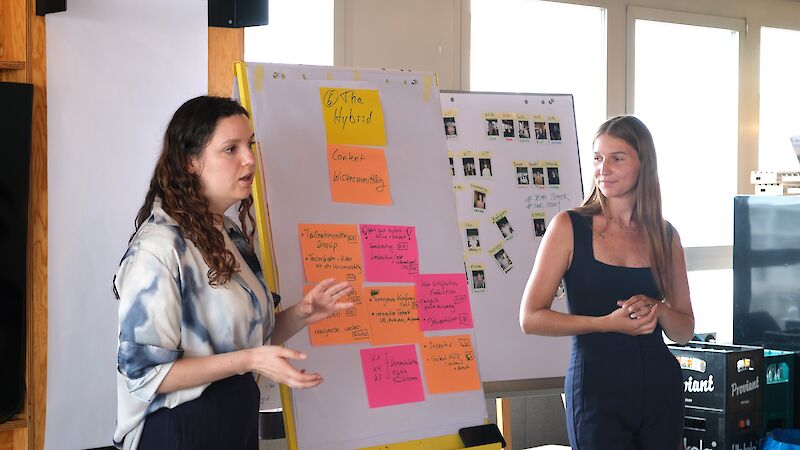 © GCB
© GCB
At a time when we are facing a multitude of global challenges, meetings, conventions, and congresses also need to be reoriented. The research phase "Navigating Business Events in Challenging Times" of the Future Meeting Space Innovation Network aims to rethink the role of business events in this era of change and to derive concrete novel and modified event formats and concepts. The social components of events as a place for shared learning and network building, as well as their support for transformation processes, will also be examined. The goal is to create "Meaningful Events" that have both a clear "Purpose" (i.e. meaning and purpose) and leave a "Legacy" (i.e. a legacy) beyond the actual event.
Purpose, Meaning und Legacy: The Triad of Meaningful Events
Interdisciplinary Impulses
The first step of the research process designed for 2023 first identified the triggers and motivations for holding business events from the organizers' perspective. In the second step, the research focused on developing new building blocks for event concepts. For this purpose, co-creative development workshops and interviews with professionals and experts from different disciplines were conducted. The inclusion of experts from the fields of community building, storytelling, dramaturgy, event psychology, business ethics, education, and diversity created an interdisciplinary perspective to develop new event building blocks.
We Thank the Participants of the Interviews and Workshops for their Expertise:
|
Detlef Altenbeck, m.next (Denkwerkstatt) |
|
Tanja Bauer-Glück, Business & Leadership Coaching |
|
Simon Dauenhauer, Roche |
|
Aditya Gupta, India Didactics Association |
|
Kathrin Horn, Telekom MMS |
|
Cornelia Ilg, Professional Meeting and Conference Organizer |
|
Birte Jung, Nachhaltigkeitsberatung | Transformationsmanagement | Stadtforschung |
|
Tanja Laub, Walkabout Media, Community Gipfel |
|
Nina Liable, Bergmanngruppe |
|
Daniel Moj, Neyroo |
|
Zoe Nogai, Telekom, Haufe Group |
|
Steffen Ronft, SRH Fernhochschule |
|
Saskia Rudolph, Spiegelneuronen – Angewandte Positive Psychologie GmbH |
|
Thorsten Sievert, smile! producing GmbH |
|
Andreas Suchanek, Handelhochschule Leipzig |
|
Sandra Stäber, Deloitte |
|
Theresa Troglauer, MICE | Sales | Hospitality | Tourismus Consulting |
|
Dennis Vilovic, Troop Travel |
|
Mascha Will-Zolloch, Hessische Hochschule für öffentliches Management und Sicherheit |
|
Harald Zeiss, Hochschule Harz |
|
Hendrik Zilien, The Janssen Pharmaceutical Companies of Johnson & Johnson |
First Insights from the Research Process
After more than 20 discussions in interviews and workshops with experts from the various disciplines mentioned above, clear trends and developments emerged that will shape future events. The experts named sustainability and digitalization as the topics with the greatest influence. But profitability, shortage of skilled workers, cost pressure, globalization, regionalization, demographics, and New Work will also play a significant role in business events of the future.
Sustainability starts at the very beginning of an event with the journey to the event, because this accounts for a significant proportion of CO2 emissions and increases the need for ecological and economic action more and more. The following generations - Gen Z, for example - attach particularly great importance to sustainability and check closely whether measures communicated as sustainable are not just greenwashing.
"Seeing sustainability as a trend is sometimes a bit concerning, because it's supposed to be standard."
In the area of digitization, hybrid formats remain an important topic. However, the experts interviewed also agree that events should predominantly take place either on-site or digitally, in order to focus on one of the two variants and their goals. Either all the advantages of digitization should be used or the opportunities to intensify personal networking on site. While learning can be conveyed and accessed virtually, the consolidation of what has been learned and the networking process primarily take place on site. According to the experts, artificial intelligence with applications such as ChatGPT will also play an important role in the future and significantly change and shape the event experience.
Another central aspect that came up in the interviews was networking. The quality of the exchange should be in the foreground at business events and therefore more time should be planned for networking. Participants in the workshops, in which the development of new event formats was discussed, stated that not only the content sessions of an event were decisive, but above all the exchange with other event guests made a lasting contribution to meaningful events.
"Either you're digital and reap all the benefits of it, or you're on-site and enjoy the opportunity to network."
In addition, those involved in the research process discussed the development of new formats. As the target groups of business events change, what happens on stage will also change. Some of the experts predicted, for example, that podcasters, YouTubers and TikTokers will dominate the stages in the future and offer variety by incorporating sketches, films, or short clips. Gamification was also mentioned by the experts as an important factor in involving the audience.
Individualization is a perennial issue in our society and means that events must be tailored more specifically to the needs of the target group. Events can no longer be designed according to the "one-size-fits-all" principle, because the atmosphere of an event, including feel-good moments, light and inspiration, is becoming increasingly important. As the boundaries between work and leisure increasingly blur, business events are taking on a festival character.
"Breaking events down to the individual according to the "one size fits all" principle no longer works."
The increasing non-committal nature of the participants was also addressed. The organizers have to deal with this challenge and find ways to involve and bind the participants more strongly.
Outlook: Periodic Table for Events
In the further course of the 2023 research phase of the Future Meeting Space Innovation Network, concrete building blocks or individual elements of a holistic event concept will now be developed and tested in order to subsequently evaluate and enrich them. The building blocks will then be combined into a modular system and practical recommendations for action will be derived from them. The aim is, for example, to design a "periodic table for events" that will serve as an orientation for the planning and design of future "meaningful" business events with wow moments.
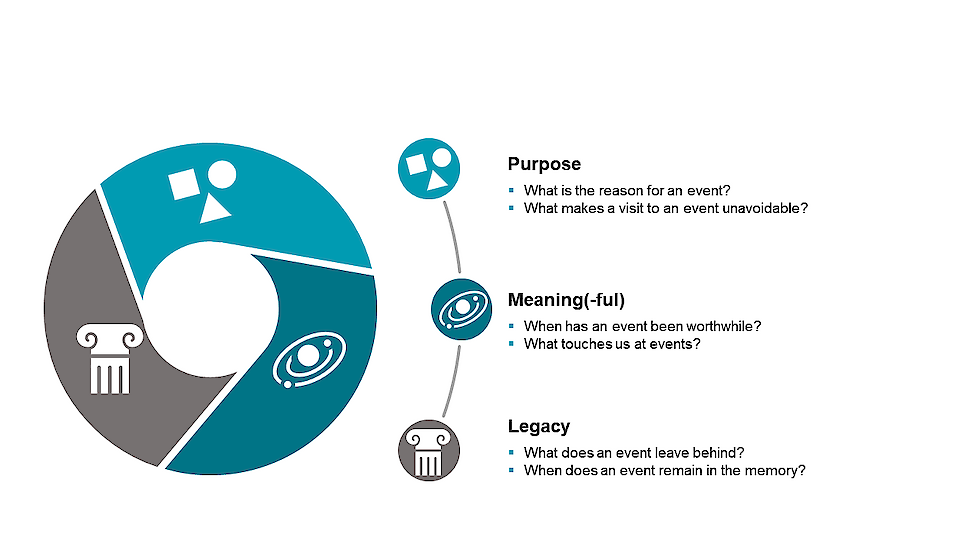
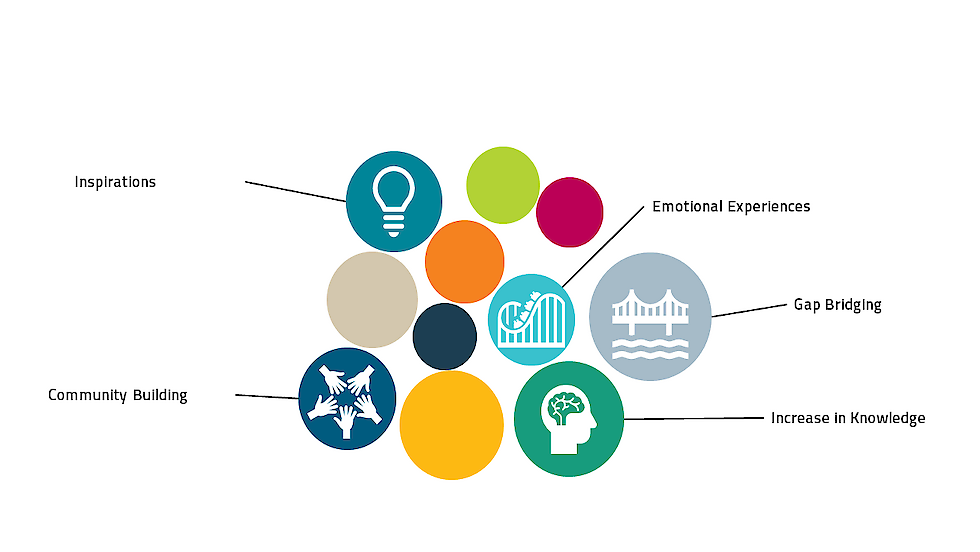
 ©
©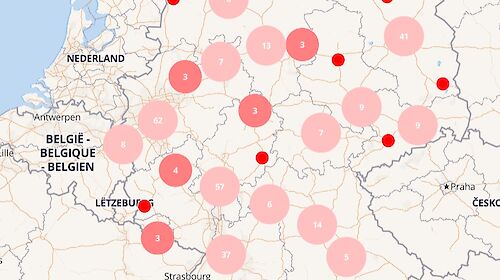 ©
© ©
©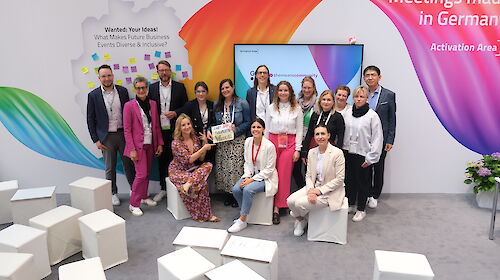 ©
©